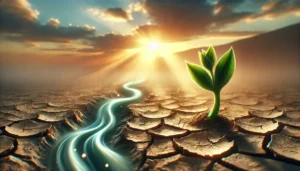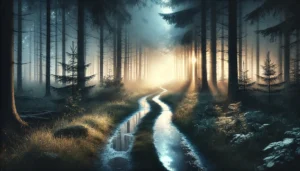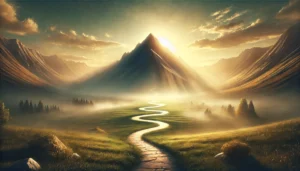We’ve all experienced that unsettling feeling when faced with a situation where we simply don’t know. It might be a big life decision, an uncertain future, or a question we can’t answer. But why does not knowing make us so uncomfortable? In a world that often demands certainty and decisiveness, admitting “I don’t know” feels risky. Yet, it’s in these moments of uncertainty where we often find the most room for growth and transformation.
Let’s explore why “I don’t know” feels so intimidating, and how embracing it can open up new possibilities.
Why Does Not Knowing Feel So Scary?
At its core, the fear of not knowing is deeply human. It touches several key aspects of our experience:
- Losing Control For many of us, certainty equals safety. When we don’t know something—especially when it involves an important decision or the unknown future—it feels like losing control. And without control, there’s vulnerability. Our minds tend to equate this uncertainty with risk, triggering anxiety as we try to protect ourselves from imagined negative outcomes.
- Fear of Judgment Admitting that we don’t know can feel like revealing a weakness. In a world where knowledge is power, saying “I don’t know” might seem like a sign of inadequacy. There’s a fear that others will judge us for not having all the answers, or that we’ll be seen as less competent or capable.
- Facing the Unknown Human beings have always been wired to fear the unknown. Thousands of years ago, not knowing what was lurking in the darkness could mean life or death. Today, while the unknown might not be as dangerous, it still triggers that primal sense of discomfort. We fear what might go wrong, and our minds naturally project worst-case scenarios when facing uncertainty.
- Identity and Control So much of our identity is wrapped up in what we know. We define ourselves by our understanding of the world and our place in it. When confronted with “I don’t know,” it feels as though our carefully constructed sense of self is being challenged. Who are we if we don’t have all the answers?
- Fear of Being Stuck Not knowing can also make us feel like we’re in limbo. We fear getting stuck in indecision, where we’re unsure which way to move forward. Our minds crave resolution, and the ambiguity of “I don’t know” can feel paralyzing.
The Opportunity Hidden in “I Don’t Know”
But here’s the thing—while the fear of not knowing feels real and intense, it is often based on our desire to hold on to control and certainty. And the reality is that life is inherently uncertain. The good news is that not knowing isn’t a dead end. It’s a door—one that, when opened, leads to greater understanding, personal growth, and freedom.
Here’s how we can transform the fear of not knowing into an opportunity for discovery:
1. Not Knowing = Growth
Admitting that you don’t know something is the first step toward learning. When you cling to the need for certainty, you close yourself off from the possibilities of growth. But when you embrace not knowing, you create space for curiosity, exploration, and new perspectives. You become open to discovering things that you wouldn’t have found if you assumed you had all the answers.
Think of it this way: the best innovators, creators, and thinkers throughout history have all started from a place of “I don’t know.” Instead of seeing uncertainty as a weakness, they saw it as an invitation to explore and create something new.
2. Embrace Vulnerability
There is immense power in vulnerability. Saying “I don’t know” allows you to drop the illusion of needing to have it all figured out. It gives you permission to be human, to admit that life is complex and uncertain. Paradoxically, this vulnerability makes you stronger. When you embrace it, you become more adaptable and resilient, less afraid of change or unexpected challenges.
3. Let Go of Judgment
The fear of judgment is real, but often exaggerated. More often than not, people appreciate honesty and openness over false confidence. When you say “I don’t know,” you create opportunities for collaboration, for shared discovery. Instead of fearing judgment, shift your mindset to one of curiosity and shared learning. You might be surprised by how liberating it feels to let go of the pressure to always be right.
4. The Unknown as Possibility
What if, instead of being scared of the unknown, you started seeing it as a space for possibility? The unknown is where new opportunities lie, where growth happens, and where life’s most exciting moments occur. Imagine if you already knew exactly how every day would unfold—how dull and uninspiring life would be.
The unknown is where magic happens. When you embrace the “I don’t know” moments, you open yourself to new paths, experiences, and even transformations that you couldn’t have planned for. These moments become the source of your greatest adventures.
5. Letting Go of Control Brings Freedom
Our need for control is often what causes the most suffering. When we try to micromanage every aspect of life, we create resistance against the natural flow of events. By embracing uncertainty, we learn to let go of this need for control. This doesn’t mean becoming passive—it means learning to flow with life, trusting that not everything needs to be figured out in advance.
In letting go, we find freedom. Freedom from the constant worry of what will happen next, freedom from the fear of making mistakes, and freedom from the anxiety of not knowing.
Turning Fear into Freedom
The phrase “I don’t know” is not a final destination; it’s a starting point. It’s the beginning of discovery, learning, and growth. It invites you to explore new possibilities and step into the unknown with a sense of curiosity rather than fear.
At first, it might feel unsettling to admit that you don’t have all the answers. But as you practice embracing not knowing, you’ll find that it actually liberates you from the burden of certainty. You’ll begin to trust the unfolding of life, knowing that each moment of uncertainty is an invitation for something new to emerge.
So the next time you find yourself at a crossroads, uncertain of what to do or where to go, remember that not knowing is not a weakness—it’s a gift. It’s the door to the unknown, where the possibilities are endless.
In the end, “I don’t know” is not something to fear. It is the key that unlocks new paths, unexpected joys, and a deeper understanding of both yourself and the world around you.



